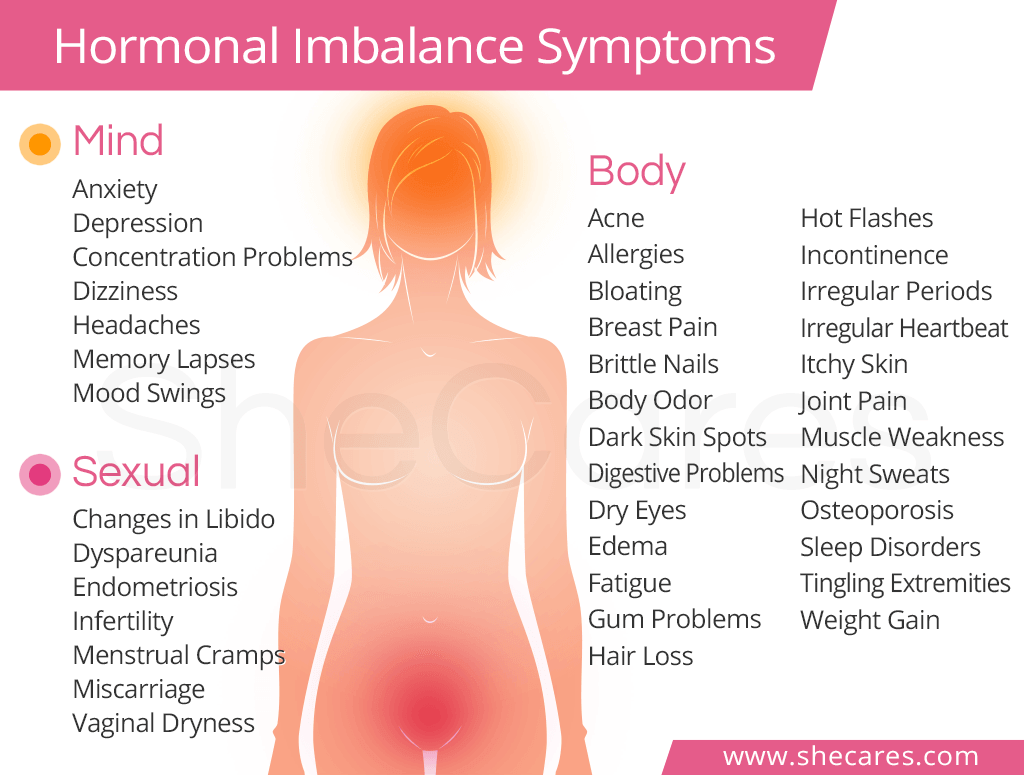Hormonal Imbalance Symptoms
Either big changes in a woman's life such as the menopause transition or simply the normal menstrual cycles during all ages can bring about major alterations to hormone levels. As hormones regulate almost all key functions of a woman's body, hormonal imbalance can create a whole host of symptoms.
Women of all ages experience many hormone changes throughout their lives. Changes in a woman's life such as puberty, pregnancy, or the onset of menopause, along with normal menstrual cycles, can bring about major alterations to hormone levels.
Different women will have different symptoms of hormonal imbalance; some may experience a mild discomfort and others may experience a combination of problematic disorders.
Because these vary from mild to life disturbing and in some cases health risks could be present, please take your time to read and learn useful information about any hormonal imbalance symptom.
Sections

All Hormonal Imbalance Symptoms
- Acid Reflux
- Acne
- Allergies
- Anxiety
- Bloating
- Blurred Vision
- Body Odor
- Breast Pain
- Brittle Nails
- Burning Mouth Syndrome
- Dark Skin Spots
- Depression
- Difficulty Concentrating
- Digestive Problems
- Dizziness
- Dry Eyes
- Dyspareunia
- Edema
- Electric Shocks
- Endometriosis
- Excessive Hair
- Fatigue
- Fibroids
- Gum Problems
- Hair Loss
- Headaches
- Hot Flashes
- Incontinence
- Infertility
- Insomnia
- Irregular Heartbeat
- Irregular Periods
- Irritability
- Itchy Skin
- Joint Pain
- Loss of Libido
- Memory Lapses
- Menstrual Cramps
- Miscarriage
- Mood Swings
- Muscle Weakness
- Night Sweats
- Oily Skin
- Osteoporosis
- Panic Disorder
- PCOS
- Perimenopause Symptoms
- PMDD
- PMS
- Postmenopause Symptoms
- Skin Patches
- Sleep Disorders
- Tingling Extremities
- Vaginal Dryness
- Voice Changes
- Weight Gain
PMS
This syndrome occurs in about 85% of menstruating women. The possible symptoms include cramps, acne, appetite changes, and digestive problems in addition to headaches, breast pain, trouble sleeping, mood changes and fatigue.

PCOS
This hormonal condition is thought to affect up to 10% of women during their reproductive years. Common symptoms include irregular periods, weight gain, excessive coarse hair growth, acne, and insulin resistance.

Perimenopause Symptoms
The most common symptoms are hot flashes, night sweats, mood swings, and irregular periods, although there are over two dozen symptoms that have been associated with the menopause transition.

Postmenopause Symptoms
In addition to menopause symptoms related to low estrogen levels - like vaginal dryness - certain health concerns may arise during postmenopause due to both low hormone levels and natural aging.

Symptoms Affecting Conception
Infertility
In about 20% of cases of female infertility, the body does not release an egg frequently or at all. This is often linked to an imbalance in the hormonal system, especially if difficulty conceiving is accompanied by ovarian cysts, excessive hair growth or loss, or abrupt weight loss or gain.
Endometriosis
In this condition, the uterus lining, or endometrium, attaches to other areas of the pelvis. These endometrial cells still respond to estrogen, but because they cannot shed like normal during a period, heavy pain and irregular bleeding typically result.
Miscarriage
Research has found that as many as 15% of pregnancies finish in miscarriage. While there are many potential causes, miscarriage may be a sign of hormonal problems. This can include issues with thyroid hormones and sex hormones.
Irregular Periods
As sex hormones are closely tied to the reproductive system, one of the first signs that hormone levels are out of balance is menstrual irregularity. Hormonal imbalance is especially common during puberty and the menopause transition, so irregular periods are likely.